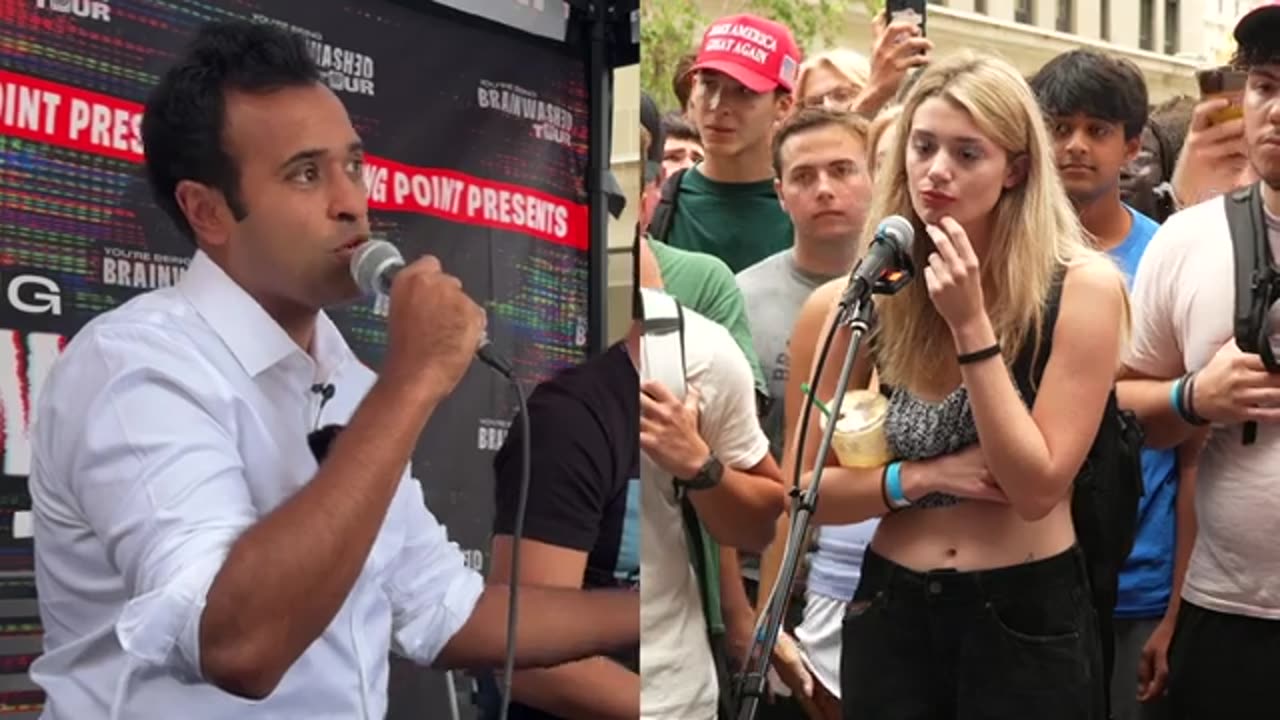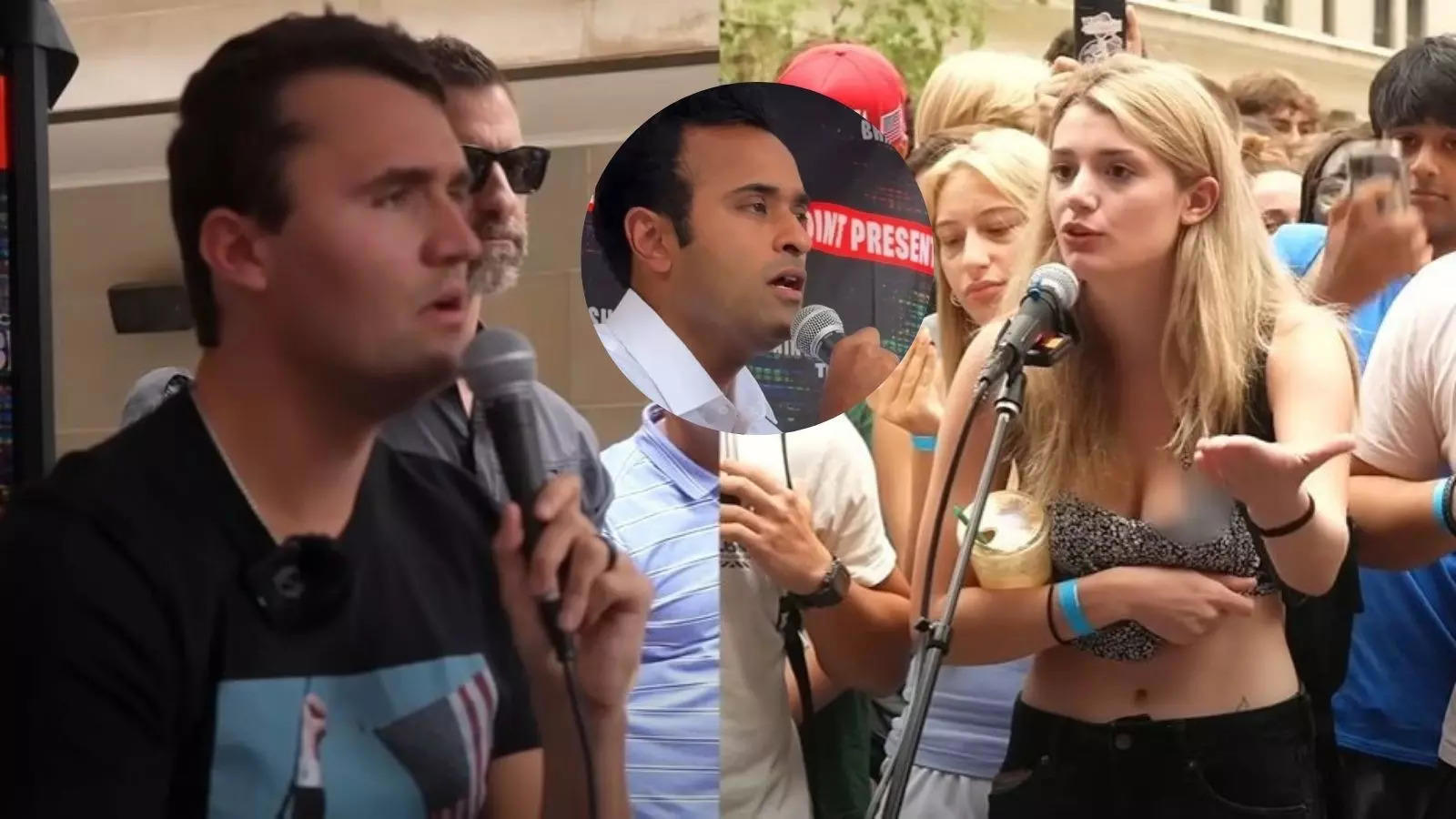Viral Moment: Charlie Kirk's Flash Incident Explained | MUST-SEE!
Is a moment of public protest a valid form of political expression, or does it cross the line into disrespect and potential incitement? The incident at the University of Pittsburgh, where a woman flashed Charlie Kirk during a debate, sparked a firestorm of controversy, forcing a reevaluation of the boundaries of political discourse in the digital age.
The event, captured in a viral TikTok video from @charliekirkdebateclips, shows a moment that quickly escalated from a heated exchange to a shocking display of public defiance. The context was Kirk's "You're Being Brainwashed" tour, an initiative of Turning Point USA, designed to engage students on controversial topics, including pressing issues like the ongoing war. The visit to the University of Pittsburgh was part of a larger tour, as Kirk, alongside figures like Vivek Ramaswamy, traveled across the United States to promote political views and ideas, particularly those associated with Donald Trump and the Republican party ahead of the presidential election on November 11th.
The implications of this action are far-reaching, sparking debate about the ethics of protest, the role of public figures, and the pervasive influence of social media. The incident itself a woman, reportedly a student, exposing herself during a debate was visually jarring, immediately grabbing the attention of the audience and media outlets alike. The immediate aftermath saw a flurry of online discussion, with many suggesting the action was intended to get Kirk and Ramaswamy banned from platforms like YouTube. The event was quickly seized upon by various news outlets and commentators, each offering a distinct perspective on its meaning and significance.
- Remoteiot Securely Access Manage Your Devices Anywhere
- Discover Your Free Open Source Iot Device Management Solution
As the dust settles, its time to take a more measured look at the key players involved. Here's a brief overview of the central figure in this controversy:
| Attribute | Details |
|---|---|
| Name | Charlie Kirk |
| Date of Birth | October 14, 1993 |
| Age | 30 (as of November 2024) |
| Education | Harper College (did not graduate) |
| Occupation | Political commentator, conservative activist, founder of Turning Point USA |
| Political Affiliation | Republican |
| Key Activities |
|
| Controversies |
|
| Website (for Reference) | Turning Point USA Official Website |
The incident quickly became a viral moment, prompting the creation of multiple reaction videos and opinion pieces. Many speculated on the woman's motivations, with some suggesting it was a deliberate attempt to disrupt the event and draw attention to Kirk and his views. Kirk himself posted the video with the caption, Did hater try to flash Charlie Kirk to get him banned on youtube? The incident also brought back discussions about online censorship and the potential for public actions to be used as a form of protest aimed at removing individuals from online platforms.
The debate at the University of Pittsburgh, and the subsequent incident, provided fertile ground for political commentary. Warren Smith, for instance, weighed in with an analysis that viewed the event through the lens of broader political strategies. The incident was not just a snapshot of a heated debate, but also a reflection of deeper tensions within the current political landscape.
- Ray Charles Music Biography Top Hits Explore Now
- Is Luke Roberts Replacing John Reardon On Hudson Rex News Updates
The context of the incident is important. Kirk's tour of university campuses, including his visit to the University of Pittsburgh, was part of a larger effort to engage with students on controversial issues. The events typically involved debates, discussions, and attempts to persuade students to adopt conservative viewpoints. The "You're Being Brainwashed" tour directly targeted the perceived biases of higher education and offered an alternative perspective. This initiative was especially significant given the upcoming presidential elections, where figures like Kirk and Ramaswamy were actively involved in promoting the ideas of the Republican party and the policies of Donald Trump.
The incident also raises questions about the boundaries of acceptable behavior during public events. Some observers have argued that the woman's actions were a form of protest that aimed to disrupt the proceedings and challenge Kirk's presence on campus. Others have condemned the act as disrespectful and inappropriate, arguing that it detracted from the debate and the seriousness of the issues being discussed. The range of responses reflects the polarized nature of contemporary political discourse, where disagreements often quickly turn into heated confrontations.
The immediate reaction to the flashing incident was often visceral, with many people sharing their opinions and reactions on social media. Discussions included questions about the legality and the ethical implications of the act. Some commentators argued that the woman's actions were a form of free speech. Others maintained that they were a form of harassment. The event provided fodder for memes, parodies, and a wide array of interpretations, demonstrating the power of the internet to shape and amplify reactions to significant events.
The legal ramifications of the incident are not yet fully clear. Depending on local laws and university policies, the woman could face potential charges related to public indecency or disorderly conduct. The university itself could also choose to investigate the incident and take disciplinary action. The situation highlights the potential for political protests to cross legal boundaries, leading to a legal confrontation. The specifics of these actions will depend on the particular circumstances of the event and the interpretations of those involved.
The incident at the University of Pittsburgh also highlights broader social and political trends. The increased use of social media as a platform for political commentary, the rise of protest movements, and the increasing polarization of American society all contribute to the complexity of this incident. The way in which it played out reflects the challenges of navigating an increasingly fragmented media landscape, where competing narratives and partisan divisions frequently clash.
Beyond the immediate reactions, the incident at the University of Pittsburgh offers an opportunity to examine critical questions about civility, respect, and free speech in the public sphere. The actions, while shocking, open doors for discussions on how to resolve differences, understand the limits of acceptable behavior, and ensure that public discourse is constructive and respectful. This incident goes beyond the actions of a single woman. Instead, it represents a complex set of forces, including social media, political division, and differing definitions of acceptable conduct in public.
The incident raises the question of the role that public figures play in shaping the discourse. Some would argue that public figures have a responsibility to model respectful behavior, while others assert that public figures should be able to express their opinions freely. The flash is just one example of a much broader debate about what constitutes acceptable conduct in political discussion, and the implications of violating these boundaries. These issues affect both those who are in the spotlight and those who interact with them.
In a media environment saturated with information and opinion, it becomes increasingly challenging to navigate political discourse. The incident involving Charlie Kirk serves as a case study. It highlights the urgent need for critical thinking and media literacy, empowering citizens to assess information, recognize potential biases, and develop their own informed opinions. It is essential to remember that the media environment shapes our perceptions and influences our interactions. As such, people should maintain a critical approach.
The incident has broader implications that extend beyond the immediate context of the University of Pittsburgh. It has the potential to influence future discussions of free speech, boundaries, and respect in the political and social landscape. The event serves as a reminder of the complex and often unpredictable nature of political discourse. The actions taken by the woman and the responses it elicited are unlikely to resolve this issue, but they do help initiate important conversations about the future of our society. The incident will continue to resonate with anyone who is watching the current political landscape.
The focus of this particular event is not just the woman's actions, but also the responses and interpretations that followed. The viral distribution of the video highlights the influence of social media on contemporary political discourse. The comments and reactions also showcase the division and emotion that have become so common in political debates. The impact of this incident goes far beyond the campus of the University of Pittsburgh, showing a trend in the modern age, where online communication and its effects are very important.
The incident has the potential to affect future political debates and interactions. Public officials, educators, and commentators may change their strategies and attitudes in response to the event and its fallout. The actions also suggest the need for clear standards of conduct to maintain safety. This will have a ripple effect throughout society. Overall, the event represents a turning point that will shape how public discourse is conducted in the future.
The story, in a nutshell, is a reminder of how quickly the public sphere can become contested territory. The incident serves as a case study for examining the interaction of political speech, social media, and personal behavior. The actions also indicate the degree to which the political and social landscape is changing. In order to create a more informed and respectful public discourse, the issue must be taken seriously. The incident has significance beyond the viral video and the immediate reaction.
The incident also raises the important issue of security at political events. The actions highlight the need for event organizers to evaluate security procedures and take measures to protect speakers and participants. The safety of all those who are attending political debates is important, which is why event security must be updated and reevaluated based on what has already occurred. Security will be a hot topic, particularly with an election season coming up.
- Exploring Ray Charles Music Legacy His Genius
- Ray Charles Biography Music Legacy Explore His Life Hits

Woman FLASHES Charlie Kirk During Debate And Almost Gets Him Banned YouTube

CHARLIE KIRK AND VIVECK RAMASWAMAY Girl Tries to Subtly Flash Charlie Kirk

Why a female college student flashed Vivek Ramaswamy and Charlie Kirk